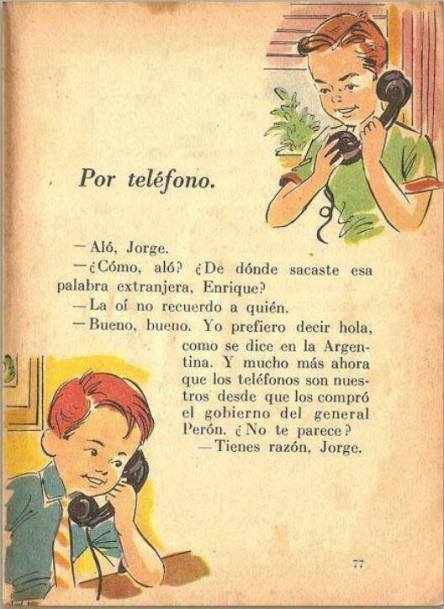Have you ever wondered how rioplatófonos answer the phone? I had never actually given it much thought. But then I came across the following picture and thought I should make a comment about it on this blog.

This seems to be a photo of an old textbook used by Argentine students around 60 years ago or so. It shows a dialogue between two children who are talking on the phone. I will first give you an approximate translation of what they are saying, and then we will focus on some specific points.
—Aló, Jorge
—What do you mean, “aló”? Where did you get that foreign word from, Enrique?
—I heard it from someone I don’t remember.
—OK, OK. I prefer to say “hola”, as it is said in Argentina. Specially now that we’ve had our own telephones since the government of the General Perón bought them. Don’t you agree?
—You are right, Jorge.
The first word that we need to pay attention to is “aló“. But Jorge has already explained it for us. As he says, rioplatófonos don’t say “aló” when answering the phone. We just say “hola“. Some people might stress the second syllable of the word, though. This “holá” version is only used when answering the phone, it is never used when greeting someone face-to-face. But the traditional “hola”, stressed on the first syllable, can always be used, both in person or on the phone.
It is interesting to point out that, apart from using “aló“, Enrique also seems to use the pronoun “tú“, instead of “vos“. His last phrase is “tienes razón“, instead of “tenés razón“. Maybe the use of “tú” was a bit more common back in those days, as a result of the influence of the Spanish that came from Spain. Or maybe people still considered the form “tú” as the correct one (or at least the one that was to appear on a textbook), and “vos” as a kind of evil deviation from the norm. 😛 That’s no longer the case, of course! But it seems then that Enrique is trying to speak in a more neutral way or to imitate other accents, whereas Jorge makes a stand for speaking the way Argentines do.
The last point I want to mention is actually a cultural reference. Did you notice that Jorge refers to Perón? Do you know who he was? Maybe you’ve heard about his wife, Evita Perón, or that famous song in her honor, “Don’t cry for me, Argentina”. Anyway, Juan Domingo Perón was elected president in 1946, reelected right afterwards in 1952, and then came back to power in 1973. He played such an important role in Argentina that there is still today a political party named after him: el peronismo.
Now, this is not a blog on politics, so we will not be discussing what role should politics play in education, or if it is right or wrong to include such references in school. But if you are interested in finding out more about what textbooks looked like during those years, you can easily search for something like “libros escolares Perón” on Google or YouTube and I’m sure you will get more examples.
Anyway, you now know how to answer the phone in the River Plate area. But what about saying goodbye before hanging up? Luckily, there is nothing special about that, haha! There is no specific word or different stress pattern for this, so you can just say something like “chau, nos vemos“. 😉